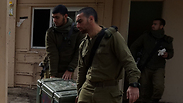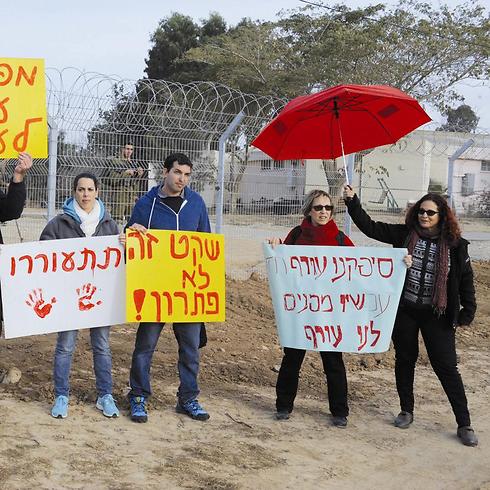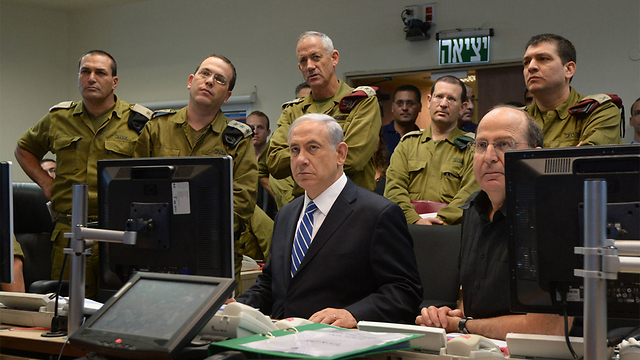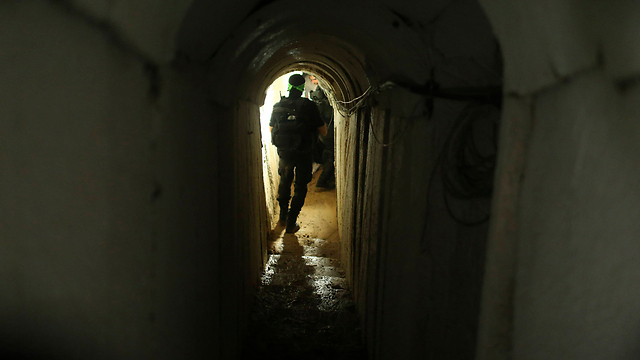
Israel's residents are entitled to answers about Gaza war
Op-ed: The political echelon appears to be sweeping the difficult questions about Operation Protective Edge under the rug. Some of these questions point to problematic discretion and serious flaws in the decision making process, says former Shin Bet chief.
The Protective Edge war took place right here in the past summer, only five months ago. A war which we didn't plan, a war which we were dragged into, a war whose goals were apparently set hastily, at the very last moment.
A war in which 72 Israelis were killed, most of them soldiers, our finest sons, who fought courageously, with a lot of devotion and impressive determination, but apparently not with the best means, in order to destroy a system of dozens of offensive tunnels which were dug from the Gaza Strip into the State of Israel.
There was clearly no intelligence surprise in the offensive tunnels issue. I can say with certainty from my deep personal involvement that until May 2011, when I retired from the Shin Bet (and as I've stated before, I would agree to any comprehensive, objective and thorough examination of the way the issue was handled in the past decade), the Shin Bet, the Southern Command and the Military Intelligence Directorate had a lot of high-quality intelligence (although not full) about the offensive tunnels, which was collected over many years, and the issue received special treatment and was made a top priority due to its gravity.

A short Google search will bring up many links to reports given in the past eight years to the Knesset's Foreign Affairs and Defense Committee, to press briefings and of course to cabinet meetings about the tunnels being dug from the Gaza Strip into the State of Israel for the purpose of carrying out terror attacks.
Intelligence and operational working groups in the Shin Bet, Southern Command and Military Intelligence Directorate collected, analyzed and assessed the information due to the deep understanding in the defense establishment regarding the serious threat posed by the offensive tunnels.
For those who don’t remember, one of the main reasons for the deterioration after the "tahadiya" (calm) period of 2008 which led to Operation Cast Lead was that the Shin Bet and Southern Command insisted on dealing with an offensive tunnel that was dug towards Kibbutz Nahal Oz, about a month and a half before the (initiated) launch of Cast Lead.
In the same operation, by the way, the booby-trapped building from which the tunnel was dug was bombed by an IDF force dispatched to the area. Luckily, there were no casualties.
After Cast Lead (January 2009), the collection of intelligence about the tunnels continued even more intensively. It was clear that Hamas was putting an exceptional effort in this area, and so the issue was made a top priority both in the Shin Bet and in the Southern Command and Military Intelligence Directorate.
There are several fundamental questions which remain unanswered:
1. In the end of 2012, about a year and a half before Operation Protective Edge, the State of Israel launched Operation Pillar of Defense which required a major reserve call-up. There is no doubt that the intelligence picture of the offensive tunnels threat and its gravity was clear to everyone.
Is it possible that the "missiles will get rusty" concept, which was attributed to Moshe Ya'alon as the IDF chief of staff against Hezbollah, was reestablished during the Netanyahu, Ehud Barak and Ya'alon period in regards to the offensive tunnels from the Strip as well?
If that was the case, why didn't anyone talk about the tunnel threat and the need to deal with it during the preparations for Pillar of Defense? Why wasn't there a ground invasion into the Strip to deal with the tunnels back then, although reserve forces had been called up on a very large scale?
2. There is no doubt that this intelligence information was presented to Netanyahu and to his defense ministers in the 2009 Netanyahu government and in the current government, Barak and Ya'alon. Netanyahu even said that he had put former National Security Advisor Major-General (res.) Yaakov Amidror in charge of the tunnels issue. Amidror confirmed it, saying candidly that not much had been done about it.
Are we witnessing a failure of the political echelon which failed to make it a top priority? Or is it possible that the security echelon (the IDF and Shin Bet) failed to properly present the importance of the intelligence it had to the prime minister, defense minister and the cabinet?
3. A month and a half before Operation Protective Edge, a puzzling decision was made to reduce the number of security coordinators in the Gaza vicinity communities. How was such a decision made if everyone was aware of the offensive tunnels threat?
From my experience, this allegedly marginal decision could very likely point to a serious failure in the evaluation of the situation and in the general feeling in the defense establishment in regards to the tunnels at the time.
4. Is it possible that the leaders of the intelligence and security system (mainly the chief of staff, Military Intelligence head and Shin Bet chief) did not bang on the doors and tables of the defense minister and prime minister about this issue on the eve of Pillar of Defense, and not even on the eve of Pillar of Defense?
5. Why were Netanyahu and Ya'alon prepared to accept a ceasefire before the ground operation began, despite the large amount of information about the offensive tunnels being dug under our territory, and although there was a clear warning (and it is my understanding that there is no argument about this between the Shin Bet and Military Intelligence Directorate) of a strategic attack through a tunnel in the Kerem Shalom area?

Wars and operations naturally expose faults, but an even more serious aspect is a failure to exhaust the investigations and implement the required lessons. I am convinced that the IDF and Shin Bet carried out many investigations, but the political echelon also owes the public an explanation for its conduct, leadership and decisions during Protective Edge, which raise many questions.
Like many others, I have more than a hunch that the political echelon is trying to sweep the answers to questions about Protective Edge under the rug. Some of these questions point to a possibility of problematic discretion and serious flaws in the decision making process.
With the absence of answers to these important questions, the Gaza vicinity's residents have extremely legitimate reasons not to believe Prime Minister Benjamin Netanyahu and to continue their justified struggle against the decision to remove soldiers from communities located more than one kilometer away from the fence, and to insist that their issue will not be taken off the table.
It is precisely now, during elections, that we must demand accountability for this issue from our elected representatives, and especially those who boast "security experience" and a "firm hand."
What does Netanyahu, "Mr. Security," have to say about this? Would Naftali Bennett and Uri Ariel accept a decision to eliminate security for settlers in Jerusalem or Judea and Samaria so calmly? And what does Avigdor Lieberman think about it? Or is he too busy with the burning fire of the investigations against his Yisrael Beiteinu party?
And I'm also asking those who are not part of the government – Isaac Herzog and Tzipi Livni and Yair Lapid and Shaul Mofaz and Zahava Gal-On and also Moshe Kahlon. Where do you stand on this issue?
Yuval Diskin is a former Shin Bet director.











